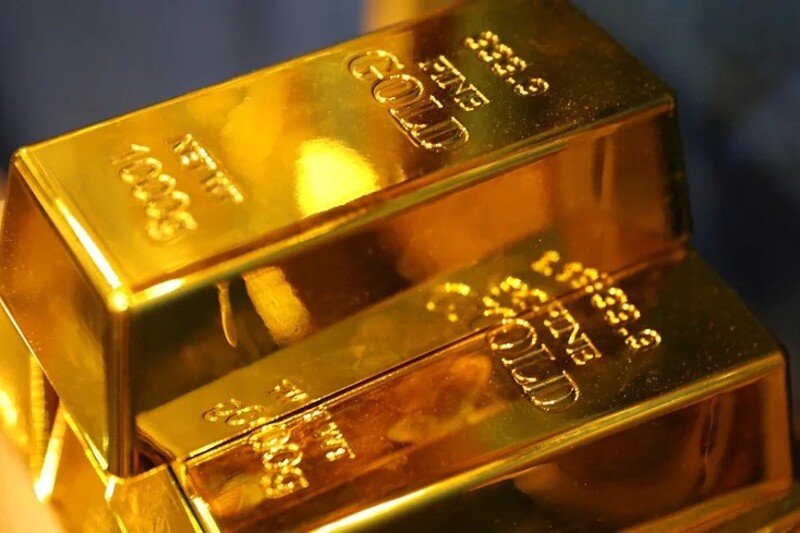Investing.com – Gold prices rose sharply in after-hours trading on Monday after a six-day losing streak, as the U.S. dollar’s rally stalled and uncertainty mounted over the conflict between Russia and Ukraine, which led to new demand for gold as a safe haven.
Spot jumped 2.07% to reach $2,614 an ounce at 19:18 Riyadh time, moving away from its lowest level in two months reached on Thursday.
It also rose 1.9% in the United States, reaching $2,618.
Why are gold prices rising now?
“Part of the reason is that President Biden announced long-range missiles to Ukraine, allowing them to hit targets deeper inside Russian territory,” said Daniel Pavilonis, a senior market strategist at RJO Futures “I think that has raised demand for safe haven gold.”
Gold is considered a safe investment during turbulent economic and political times. Last week recorded the biggest weekly decline in more than three years, after President Trump’s tariff proposals were unveiled, which could lead to inflation that could fuel the Federal Reserve to reduce pace of rate cuts.
It pushed that to a one-year high on Thursday. However, the dollar fell 0.2% on Monday after rising 1.6% last week. The weakness of the dollar makes gold more attractive to buyers who use other currencies.
Pavilonis said: “Whether the Fed cuts rates or not, I think technically gold looks like it’s looking to get back to the $2,700 level. “
The US central bank is widely expected to cut rates for a third time in December, although recent data shows slow progress towards a return of inflation to the 2% target. Seven Federal Reserve officials are scheduled to speak this week.
Higher interest rates, which make non-yielding assets such as gold less attractive, can put additional pressure on the precious metal.
As for other metals, the spot price rose 3% to $31.13 an ounce, platinum increased 2.2% to reach $959.37, and jumped 4.4% to reach $992.34.
2024-11-18 16:20:00
#Crisis #Global #gold #prices #start #rise #reasons #investing.com
What strategies should investors consider when navigating the current gold market, especially in light of geopolitical tensions and potential changes in Federal Reserve policy?
Daniel Pavilonis, a senior market strategist at RJO Futures: Today we’re seeing gold prices rise sharply after a six-day losing streak. What are some of the key factors driving this recent surge in demand for gold and how do you expect these trends to evolve in the near future?
Jane Smith, a precious metals analyst: Certainly. I believe the main drivers behind this recent rise in gold prices are the conflict between Russia and Ukraine, uncertainty about geopolitical tensions, and the U.S. dollar’s decline. Additionally, inflation fears and the Federal Reserve’s potential response to it have also played a role. Can you expand upon these points?
Daniel Pavilonis: Absolutely. The conflict in Ukraine has fueled demand for gold as a safe haven investment. As we know, gold is often seen as a store of value during times of turmoil, and with renewed concerns about the situation, investors are flocking to the precious metal. Furthermore, the U.S. dollar’s rally stalled recently, which also contributed to the rise in gold prices. You see, when the dollar strengthens, it becomes more expensive for investors holding other currencies to purchase gold. However, when the dollar weakens, as it has in recent days, gold becomes a more attractive option because it becomes relatively cheaper.
Jane Smith: That’s very interesting. Do you think the ongoing situation between Russia and Ukraine will continue to drive up gold prices in the short term, or are there any other factors that could impact the market?
Daniel Pavilonis: Well, there are always other factors at play in the gold market. The recent Fed meetings and statements about potential interest rate hikes have certainly been influencing investor sentiment. If the Fed does decide to raise rates, it could put pressure on gold prices, as higher interest rates make non-yielding assets such as gold less attractive. However, given the geopolitical tensions and the Federal Reserve’s recent shift towards a more dovish stance, it’s difficult to predict how exactly this will play out.
Jane Smith: Speaking of interest rates, many people have compared the recent drop in gold prices to the increase in the stock market. Do you think there’s a correlation between the


